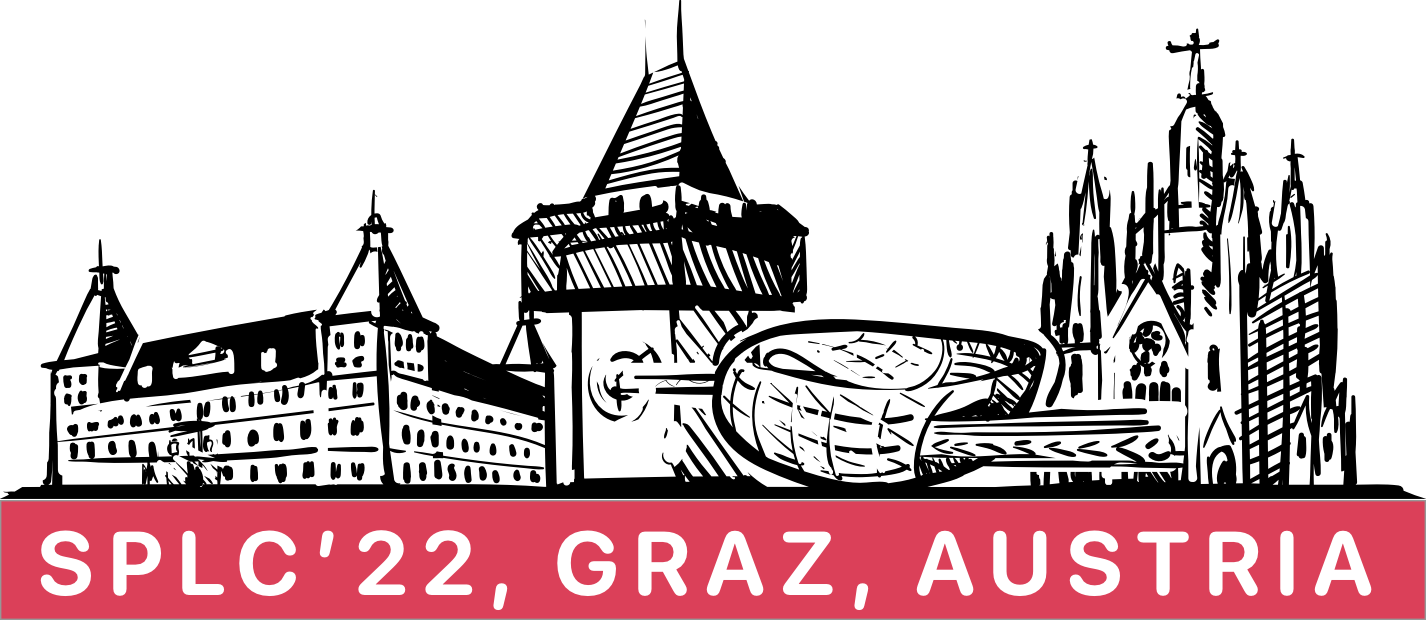We are currently in Phase 2 of the challenge track, and the Call for Solutions is open. The following cases have been selected as representative and timely research challenges in the area of software and system product line engineering. Check the complete information of the challenges at: https://variability-challenges.github.io
The newly accepted challenges are
A Benchmark for Active Learning of Variability-Intensive Systems
Shaghayegh Tavassoli, Carlos Diego Nascimento Damasceno, Mohammad Reza Mousavi and Ramtin Khosravi
Challenges Accepted in Previous Years
Variability Fault Localization: A Benchmark
Kien-Tuan Ngo, Thu-Trang Nguyen, Son Nguyen and Hieu Vo Dinh
Managing Systems Evolving in Space and Time: Four Challenges for Maintenance, Evolution and Composition of Variants
Gabriela Karoline Michelon, David Obermann, Wesley K. G. Assunção, Lukas Linsbauer, Paul Grünbacher and Alexander Egyed
Testing Configurable Software Systems: The Failure Observation Challenge
Fischer Ferreira, Markos Viggiato, MaurÍcio Souza and Eduardo Figueiredo
Variability Management meets Microservices: Six Challenges of Re-Engineering Microservice-Based Webshops
Wesley K. G. Assunção, Jacob Krüger and Willian D. F. Mendonça
A BDD for Linux? The Knowledge Compilation Challenge for Variability
Thomas Thüm
Applying Product Line Engineering Concepts to Deep Neural Networks
Javad Ghofrani, Ehsan Kozegar, Anna Lena Fehlhaber, and Mohammad Divband Soorati
Product Sampling for Product Lines: The Scalability Challenge
Tobias Pett, Thomas Thüm, Tobias Runge, Sebastian Krieter, Malte Lochau, and Ina Schaefer
Apo-Games – A Case Study for Reverse Engineering Variability from Cloned Java Variants
Jacob Krüger, Wolfram Fenske, Thomas Thüm, Dirk Aporius, Gunter Saake, and Thomas Leich
Feature Location Benchmark with ArgoUML SPL
Jabier Martinez, Nicolas Ordoñez, Xhevahire Tërnava, Tewfik Ziadi, Jairo Aponte, Eduardo Figueiredo, and Marco Tulio Valente
Interoperability of Software Product Line Variants
Ferruccio Damiani, Reiner Hähnle, Eduard Kamburjan, and Michael Lienhardt
Localizing Configurations in Highly-Configurable Systems
Paul Gazzillo, Ugur Koc, Thanhvu Nguyen, and Shiyi Wei
Each of these cases presents a set of concrete tasks (some of which may be optional) which are to be solved by the participants. The case descriptions, which typically include pointers to additional resources, are available through the respective links above.
The SPLC Challenge Track now seeks your solutions to all of these interesting problems of various natures. To participate, select a case you are interested in and submit a paper that tackles the tasks and challenges described in that challenge case. You are welcome to submit multiple papers, where each paper is related to one case. Papers should be accompanied by solution artefacts as necessary, depending on the case study and the concrete tasks which are to be solved. Thus, solution artefacts may range from hand-crafted sketches or models to fully automatically generated development artefacts or analysis results. Wherever possible, solution artefacts should be made available in a public repository or be hosted on a publicly available website to ensure the reproducibility of the results. The paper should include a description of your solution and include an evaluation according to the evaluation criteria stated by the respective case description. Note that early ideas, early results, and partial solutions are welcome. Also, note that submissions that apply existing tools and techniques to address a given challenge are also welcome.
Solutions will be evaluated by program committees, one separate committee per case, which are comprised of reviewers who have the expertise required to evaluate submitted solutions. Typically, one or two case authors are part of a case’s PC. Accepted solutions will be presented and discussed at the conference and their corresponding papers will be published in the official conference proceedings. Please note that case authors cannot submit a solution to their own challenge.
Submission Information
If you have a solution for a challenge from the list above, please submit it through EasyChair (https://easychair.org/conferences/?conf=splc2022 – Challenge Solutions). Solutions have a maximum of 4 pages including all text, figures etc + 1 additional page containing only references may be included. Accepted papers will be presented during the conference. At least one author of each accepted solution must register for the conference. Submissions must follow the ACM Master Article Template: https://www.acm.org/publications/proceedings-template.
Latex users are indicated to use the “sigconf” option, so they are recommended to use the template that can be found in “sample-sigconf.tex”. In this way, the following latex code can be placed at the start of the latex document:
\documentclass[sigconf]{acmart}
\acmConference[SPLC'22]{26th ACM International Systems and Software Product Line Conference}{12--16 September, 2022}{Graz, Austria}
Important Dates (AoE time)
The following describes the important dates for the whole timeline of the challenge track.
The following describes the important dates for solution submissions.
Solution submission deadline: June 14, 2022Solution notification deadline: June 30, 2022Camera-ready solution papers: July 7, 2022- Main Conference: September 14-16, 2022
Chairs
- Shaukat Ali, Simula Research Laboratory, NOR
- Paolo Aracaini, National Institute of Informatics, JPN
- Mikaela Cashman, Oak Ridge National Laboratory, USA
- Diego Damasceno, Radboud University, NLD
- Lea Gerling, University of Hildesheim, DEU
- Stefania Gnesi, CNR-ISTI Pisa, ITA
- Jabier Martinez, Tecnalia, ESP
- Raffaela Mirandola, Politecnico di Milano, ITA
- Clement Quinton, University of Lille, FRA
- Paul Temple, University of Namur, BEL

